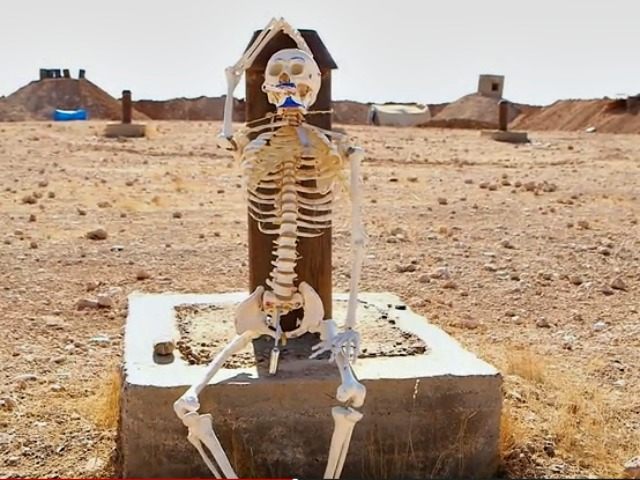Kurdistan Region President Masoud Barzani suggested in an interview this week that his forces, the Kurdish Peshmerga, could travel to Raqqa, Syria and participate in an assault to liberate it from the Islamic State (ISIS).
Raqqa is almost 350 miles from Erbil, Iraq – the capital of the Kurdistan Regional Government of Iraq (KRG), and widely considered Arab territory with a small Kurdish population. It is the “capital” of the self-proclaimed Islamic State “caliphate.”
“With many victims the Peshmerga have achieved considerable victories, and our current priority is to fight IS,” Barzani explained in an inteview with the French publication Journal du Dimanche, according to Kurdish media outlets. “Until we eliminate this organisation in Iraq and Syria, the threat of terrorism will remain present in the region and the world. Under a strong international coalition, it is possible that the Peshmerga also form part of the forces that will free the city of Raqqa.”
Barzani admitted that, as an international problem, the Islamic State’s defeat “requires a radical overhaul of our strategies.”
The French government has welcomed Barzani’s statement. “I saw this morning that President Barzani says ‘I’m willing to go to Raqqa.’ Well yes, we will have to organize ourselves to take Raqqa. Tomorrow’s objective is Raqqa,” French Defense Minister Jean-Yves Le Drian said in response to the interview.
In an analysis of Barzani’s statements, attorney Ferid Hisso suggested that he may not have been referring to the Iraqi Peshmerga, who have traditionally kept to northern Iraq and recently eradicated the Islamic State from Sinjar City, home to much of the nation’s Yazidi population before the Islamic State’s occupation and subsequent genocide. “President Barzani’s remarks might refer to the participation of Rojava’s Peshmerga forces and not the Iraqi Kurdistan’s Peshmerga forces,” he said.
Rojava is the Kurdish term for Syrian Kurdistan, governed not by the KRG but the People’s Democratic Union (PYD) and its forces, the People’s Protection Units (YPG and its all-female brigade, the YPJ. The Pentagon has expressed hesitation in the past regarding the possibility that the YPG would participate in the retaking of Raqqa; the Peshmerga have not received mention. “Whether or not Kurdish fighters are willing to move that far south, frankly, is an unknown at this point. We have not seen Kurds operate in Arab territory very much,” Pentagon spokesman Col. Steve Warren said in October, explaining why American officials are placing such emphasis on training Arab fighters. “As far as pressure on Raqqa, you know, this is why our partnership with the Syrian Arabs is so vital, because the Syrian Arabs really have the ability to pressure Raqqa heavily,” he added.
PYD representatives have stated their public desire to help liberate Raqqa, however. “We have no objection to more cooperation with the U.S. and going ahead to Raqqa,” PYD Co-Chair Saleh Muslim told reporters in September.
A report in CNN today suggests that the YPG is already closing in on Raqqa despite the ethnic differences between the groups, thanks in part to French airstrikes on the area prompted by the November 13 terror attacks in Paris. They are fighting as part of a new militia, however, the “Syrian Democratic Forces,” which also includes Arab fighters. Observers hope that a joint Kurdish-Arab effort will help prevent the possibility of ISIS using a Kurdish-only attack to convince Arabs that the liberation of Raqqa is a Kurdish invasion.
“The day after liberating Raqqa, the [Syrian Kurds] would become an occupier in that Arab city, potentially boosting local support for the Islamic State, which at its core is Arab,” explains Soner Cagaptay, an analyst at the Washington Institute for Near East Policy, to Newsweek. In addition to potentially providing ISIS with recruiting fodder, support from the U.S. for the Kurdish YPG and its ally, the Kurdistan Workers’ Party (PKK), could irk the government in Ankara. Turkey is a participant in the war against the Islamic State but adamantly opposes both Kurdish factions, going as far as to accuse the YPG of “ethnic cleansing” of Arabs in towns liberated for ISIS in order to lay the groundwork for a Kurdish state.
While Turkey opposes any expansion of PYD or PKK governance in Syria, its government has fostered a warm relationship with Erbil, which has also expressed concern that YPG and PKK forces have expanded and come to threaten the KRG’s leadership. Masoud Barzani and his relatives in government repeatedly called for PKK and YPG forces to leave Sinjar, a dispute that delayed the ultimate liberation of that city by weeks and possibly months. The PKK, a Marxist group designated a terrorist organization by the United States, does not acknowledge political differences among Kurds and views all Kurdish land to be one Kurdistan. The government in Erbil disagrees.
“They should pull out and they must because the people of Sinjar will determine their own future and this is Iraqi Kurdistan. Would the PKK be happy if a Kurdish political party inside Iraq meddled in the affairs of Diyarbakir or Mardin?” said Masrour Barzani, head of Iraqi Kurdistan’s intelligence forces and son of President Barzani, in July, citing Kurdish-majority cities in Turkey with strong PKK presences.
The presence of Peshmerga in the battle for Raqqa may assuage Turkish concerns that Syrian Kurdish forces are looking to expand south, just as their presence may also invoke precisely the sort of opposition Masrour Barzani theorized about regarding a hypothetical Peshmerga presence in Diyarbakir. While ultimately still theoretical, however, the peshmerga have proven among the most successful military outfits fighting the Islamic States, and could very well contribute the ground troops necessary to eradicate ISIS from its self-declared capital.

COMMENTS
Please let us know if you're having issues with commenting.